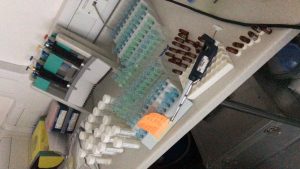Congratulations to FHSS PhD student Isabell Nessel who published part of her integrated PhD thesis in the Journal for Parenteral and Enteral Nutrition last week.
The paper “Long‐Chain Polyunsaturated Fatty Acids and Lipid Peroxidation Products in Donor Human Milk in the United Kingdom: Results From the LIMIT 2-Centre Cross-Sectional Study” resulted from a collaboration between BU (Isabell Nessel, Prof Jane Murphy, Dr Simon Dyall – now at the University of Roehampton), Poole Hospital NHS Foundation Trust (Prof Minesh Khashu), and St. George’s University Hospitals NHS Foundation Trust (Dr Laura De Rooy) (1). Full text can be found here: https://onlinelibrary.wiley.com/doi/full/10.1002/jpen.1773

This paper shows for the first time that donor human milk in the UK has very low levels of essential fatty acids, which are important for brain and eye development. Furthermore, donor human milk has higher lipid degradation than preterm and term breast milk. This could have important implications for preterm infant nutrition as exclusive unfortified donor human milk feeding might not be suitable long term and may contribute to the development of major neonatal morbidities.
This study followed from a narrative review Isabell and her supervisors Prof Minesh Khashu and Dr Simon Dyall published last year, which suggested that current human milk banking practices might have detrimental effects on essential fatty acid quality and quantity in donor human milk (2).
Isabell
Reference
- Nessel, Isabell, et al. “Long‐Chain Polyunsaturated Fatty Acids and Lipid Peroxidation Products in Donor Human Milk in the United Kingdom: Results From the LIMIT 2‐Centre Cross‐Sectional Study.” Journal of Parenteral and Enteral Nutrition(2020).
- Nessel, Isabell, Minesh Khashu, and Simon C. Dyall. “The effects of storage conditions on long-chain polyunsaturated fatty acids, lipid mediators, and antioxidants in donor human milk–a review.” Prostaglandins, Leukotrienes and Essential Fatty Acids(2019).
 BU’s PGR Isabell Nessel presenting at the 13th Congress of the International Society for the Study of Fatty Acids and Lipids in Las Vegas
BU’s PGR Isabell Nessel presenting at the 13th Congress of the International Society for the Study of Fatty Acids and Lipids in Las Vegas










 Dr. Chloe Casey on Sky News
Dr. Chloe Casey on Sky News Final Bournemouth University publication of 2025
Final Bournemouth University publication of 2025 On Christmas Day in the Morning…
On Christmas Day in the Morning… New Nepal scoping review on maternal & neonatal health
New Nepal scoping review on maternal & neonatal health ECR Funding Open Call: Research Culture & Community Grant – Application Deadline Friday 12 December
ECR Funding Open Call: Research Culture & Community Grant – Application Deadline Friday 12 December MSCA Postdoctoral Fellowships 2025 Call
MSCA Postdoctoral Fellowships 2025 Call ERC Advanced Grant 2025 Webinar
ERC Advanced Grant 2025 Webinar Horizon Europe Work Programme 2025 Published
Horizon Europe Work Programme 2025 Published Horizon Europe 2025 Work Programme pre-Published
Horizon Europe 2025 Work Programme pre-Published Update on UKRO services
Update on UKRO services European research project exploring use of ‘virtual twins’ to better manage metabolic associated fatty liver disease
European research project exploring use of ‘virtual twins’ to better manage metabolic associated fatty liver disease